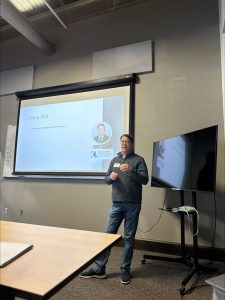
Five Kim Lahey Killough attorneys named 2025 Best Lawyers
Five Kim Lahey Killough attorneys named in Best Lawyers for work in intellectual property, corporate and employment law
Kim, Lahey & Killough Law Firm is honored to announce that five of the firm attorneys are named in The Best Lawyers in America® 2025 edition:
 Charleston patent attorney B. C. Killough is recognized for his work in:
Charleston patent attorney B. C. Killough is recognized for his work in:
- Business Organizations (including LLCs and Partnerships)
- Corporate Law
- Litigation – Intellectual Property
- Patent Law
- Trademark Law
Previously, Killough was honored as the Corporate Law Lawyer of the Year for the Charleston metro in 2015.
 In the Greenville, SC metro market, four Kim, Lahey & Killough attorneys are recognized, including firm founder Douglas W. Kim, who is honored for his work in the areas of:
In the Greenville, SC metro market, four Kim, Lahey & Killough attorneys are recognized, including firm founder Douglas W. Kim, who is honored for his work in the areas of:
- Litigation – Intellectual Property
- Litigation – Patent
- Patent Law
- Trade Secrets Law
- Trademark Law
Kim has previously been recognized as a Lawyer of the Year in Greenville, SC, in two of these areas: as Trademark Lawyer of the Year in 2022 and the Patent Lawyer of the Year in 2019.
Greenville intellectual property attorney Seann Lahey is recognized for his work in:
is recognized for his work in:
- Trademark Law
Additionally, Seann has extensive experience dealing with international and U.S. patent prosecution. His practice also regularly includes matters on trademarks, copyrights, trade secrets, licensing of intellectual property rights, and rendering legal opinions on validity, infringement and enforceability of intellectual property rights, as well as litigation involving intellectual property rights.
IP attorney Hunter S. Freeman is commended for his work in:
is commended for his work in:
- Commercial Litigation
- Copyright Law
- Litigation – Intellectual Property
- Trademark Law
As an Intellectual Property attorney, experienced litigator and certified mediator, Hunter Freeman’s 20+ years of experience and insight provide novel ways for clients to create value through the protection, prosecution and enforcement of their IP.
Attorney Casey Martens practices employment and business law in both the Greenville SC and Brevard NC offices of Kim, Lahey & Killough. Licensed in South Carolina, North Carolina and Georgia, her law practice focuses in the areas of business disputes and litigation, state and federal employment law, drafting and enforcement of restrictive covenants, and business disputes involving tortious interference with contract. Casey is recognized as a 2025 Best Lawyers One to Watch in America in the areas of:
- Employee Benefits (ERISA) Law
- Labor and Employment Law – Employee
- Labor and Employment Law – Management
- Litigation – Labor and Employment
Since 1983, The Best Lawyers in America has compiled and reviewed peer evaluations from across the United States to identify an annual list of honorees. The Best Lawyers in America recognizes only the top 5.3% of lawyers in the nation across 150 practice areas.
With offices in Greenville and Charleston, SC and Brevard, NC, the Kim, Lahey & Killough Law Firm is devoted to helping clients establish, enforce, and leverage their intellectual property rights from the Upstate, to the Lowcountry to across the globe.

Seven attorneys named 2024 Legal Elite
Seven Kim, Lahey & Killough attorneys listed as 2024 Legal Elite by Charleston Business and Greenville Business Magazines

Kim, Lahey & Killough is pleased to announce that seven attorneys have been named in the 2024 Legal Elite lists. Notably, all five of the firm’s registered patent attorneys were recognized for their work in the areas of intellectual property and innovation, a core focus of the law firm.
Greenville Business Magazine and Charleston Business Magazine recognized Doug Kim, Seann Lahey, Hunter Freeman, Robert Merting and B.C. Killough for their contributions to Intellectual Property and Innovation. “This recognition from our peers is a testament to the depth and breadth of our IP practice, as well as our firm’s commitment to excellence. We are honored to have our entire patent team acknowledged, alongside our talented colleagues in employment and corporate law,” commented firm founder, Doug Kim. Additionally, Casey Martens and Emily Bohan were honored for their work in Employment Law and Corporate Law – Business Organization matters.
Doug Kim is no stranger to legal awards and accolades. In addition to his Legal Elite IP and Innovation recognition, Kim has been listed in South Carolina Super Lawyers annually since 2017, and he has been recognized in the Greenville, SC Best Lawyers® list, named the Best Lawyers® Trademark Lawyer of The Year, the Best Lawyers® Patent Lawyer of The Year, and an IP Star by Managing Intellectual Property magazine.
Firm co-founder Seann Lahey is noted for his IP and Innovation work not only by Legal Elite of the Upstate but is also listed in South Carolina Super Lawyers as well as Best Lawyers in America for his work in intellectual property law. Seann has extensive experience dealing with international and U.S. patent prosecution, trademarks, copyrights, trade secrets, licensing of intellectual property rights, and rendering legal opinions on validity, infringement and enforceability of intellectual property rights, as well as IP litigation.
Hunter Freeman has over 20 years of experience as a litigator and certified mediator and works to provide novel ways for clients to create value through the protection, prosecution and enforcement of their IP including trademarks, service marks and copyrights. As the 2024 Chairman of the InnoVision Awards, Hunter works hard to provide opportunities for start ups and businesses in the state to advance technological innovations. In addition to Legal Elite, Hunter has been recognized for his legal efforts by both Super Lawyers and The Best Lawyers in America ® for his work in intellectual property and business litigation.
Greenville patent attorney Robert Merting joins his colleagues as a named Legal Elite for IP and Innovation this year. Robert’s general business practice serves a variety of clients and industries, including builders, manufacturers, inventors, professionals and governmental organizations. He counsels businesses and individuals on IP contracts, corporate IP agreements, trademarks, non-disclosure agreements, and patents.
Charleston patent attorney B.C. Killough has counseled businesses and professionals for over 30 years. Regularly recognized for his legal efforts on behalf of his clients, Killough’s Legal Elite for IP and Innovation award is joined by recognition as a Senior Fellow by the Litigation Counsel of America, as an AV preeminent rated attorney with Martindale-Hubbell, as a Best Lawyers Corporate Lawyer of the Year for the Charleston market, and Thomson Reuters has recognized Killough as a Stand-Out Lawyer – a recognition bestowed by in-house counsel peers.
Casey Martens is recognized as a Legal Elite for her work in employment law for both plaintiffs and defendants. Casey’s legal practice includes business litigation, intellectual property and employment counsel to small and medium-sized businesses, as well as to employees in employment disputes. Licensed to practice in South Carolina, North Carolina and Georgia, Casey heads up the firm’s Brevard, NC office.
Business attorney Emily Bohan is commended as a Legal Elite for her efforts with Corporate Law – Business Organization matters. Emily focuses her legal practice on franchise law, business formation and organizations (Including LLC’s and Partnerships), and labor and employment matters. And when businesses are in a dispute, Emily serves as a certified mediator, to assist parties to come to a resolution outside of the courtroom. Greenville Business Magazine recognized Emily as a 2024 SC Women in Business.
The Legal Elite are selected annually through peer nominations from attorneys throughout the state of South Carolina in 50 legal practice areas.
About Kim, Lahey & Killough
With offices in Greenville and Charleston, SC and Brevard, NC, the Kim, Lahey & Killough Law Firm is devoted to helping clients establish, enforce, and leverage their intellectual property rights from the Upstate, to the Lowcountry to across the globe.

Emily Bohan named 2024 Women in Business
 Congratulations to Kim, Lahey & Killough Greenville Attorney Emily Bohan, named one of the 2024 SC Women in Business in recognition of her outstanding contributions to the legal and business communities in Greenville.
Congratulations to Kim, Lahey & Killough Greenville Attorney Emily Bohan, named one of the 2024 SC Women in Business in recognition of her outstanding contributions to the legal and business communities in Greenville.
Emily Bohan has served as a leader and mentor to small and medium business owners for years. She has been a member of the Greenville Professional Women’s Forum member since 2011 and has served as an executive board member for the 2017-18, and 2020-2021 terms. Her dedication to empowering women in business and fostering their growth and development has been unwavering.
Her commitment to fostering collaboration and knowledge sharing within the local business community is exemplified by her co-founding of the networking group, a local confidential peer advisory forum My Trusted Advisors. This initiative has provided a valuable platform for small and medium-sized business owners to connect, learn, and grow together.
Emily Bohan’s business acumen is best defined through her experience running the Greenville PuroClean franchise, which she owned, managed and recently sold after 15 successful years. Her firsthand experience in navigating the complexities of running a franchise operation equips her with insights into the myriad of challenges faced by businesses. During her years there she was active and served as a presenter in both PuroClean’s Impact Group and PuroWomen, a women’s growth group. She has Chaired the Greenville Technical College, Environmental, Occupational Health & Safety Advisory Committee since 2022.
“What the public does not see every day is Emily’s determination to not only provide top notch legal representation to her legal clients, but to advance the knowledge base and successes of her peers through the delivery of continuing legal education courses and lunch and learns to educate and uplift those around her. Emily is a true asset to the legal and business communities in Greenville. Her leadership, mentorship, and entrepreneurial spirit are deserving of this recognition and we are proud to have her on our team.”
Emily Bohan focuses her law practice in the areas of business, franchise and employment law and is featured on page 48 of the July issue of Greenville Business Magazine.

2024 South Carolina Super Lawyers
Five Kim, Lahey & Killough attorneys named in 2024 South Carolina Super Lawyers
Four patent attorneys with Kim, Lahey & Killough – Doug Kim, Seann Lahey, B.C. Killough and Hunter Freeman – have been named in the 2024 South Carolina Super Lawyers list as top-rated intellectual property attorneys and attorney Casey Martens has been named in the 2024 South Carolina Rising Stars list as a top-rated employment and labor attorney in the Greenville and Charleston markets. 2024 marks the tenth year that B.C. Killough has been honored with inclusion on the list. “I am honored to work with such a dedicated, innovative team that puts our clients first and this recognition showcases our unwavering commitment to excellence in providing legal services,” commented firm founder Doug Kim.
Each year, no more than five percent of the lawyers in the state are selected by the research team at Super Lawyers to receive the honor of inclusion on the Super Lawyers list and no more than 2.5 percent of the lawyers in the state are selected to be listed as Rising Stars. Super Lawyers, part of Thomson Reuters, is a rating service of outstanding lawyers from more than 70 practice areas who have attained a high degree of peer recognition and professional achievement.
 Doug Kim has been listed in South Carolina Super Lawyer annually since 2017. With experience with matters in brand and invention protection, licensing, patents, trademarks, and business disputes, he has also been recognized in the Greenville, SC Best Lawyers® list, named the Trademark Lawyer of The Year, the Best Lawyers® Patent Lawyer of The Year, an IP Star by Managing Intellectual Property magazine and a Legal Elite of the Upstate by Greenville Business Magazine.
Doug Kim has been listed in South Carolina Super Lawyer annually since 2017. With experience with matters in brand and invention protection, licensing, patents, trademarks, and business disputes, he has also been recognized in the Greenville, SC Best Lawyers® list, named the Trademark Lawyer of The Year, the Best Lawyers® Patent Lawyer of The Year, an IP Star by Managing Intellectual Property magazine and a Legal Elite of the Upstate by Greenville Business Magazine.
 Firm co-founder Seann Lahey’s practice seeks to provide comprehensive and integrated legal services for companies whose products or services are technical in nature. Seann has extensive experience dealing with international and U.S. patent prosecution, trademarks, copyrights, trade secrets, licensing of intellectual property rights, and rendering legal opinions on validity, infringement and enforceability of intellectual property rights, as well as ip litigation. He advises startups, middle market companies, multinational corporations, universities, and individuals alike on various intellectual property protection and enforcement strategies. Seann has worked across a range of technologies and industries including automotive, agriculture, biotech, composite technology, construction, education, manufacturing, medical, and others. In addition to Super Lawyers, he has also been recognized by Greenville Business Magazine as a Legal Elite of the Upstate for his work in intellectual property law.
Firm co-founder Seann Lahey’s practice seeks to provide comprehensive and integrated legal services for companies whose products or services are technical in nature. Seann has extensive experience dealing with international and U.S. patent prosecution, trademarks, copyrights, trade secrets, licensing of intellectual property rights, and rendering legal opinions on validity, infringement and enforceability of intellectual property rights, as well as ip litigation. He advises startups, middle market companies, multinational corporations, universities, and individuals alike on various intellectual property protection and enforcement strategies. Seann has worked across a range of technologies and industries including automotive, agriculture, biotech, composite technology, construction, education, manufacturing, medical, and others. In addition to Super Lawyers, he has also been recognized by Greenville Business Magazine as a Legal Elite of the Upstate for his work in intellectual property law.
 B.C. Killough celebrates his tenth year listed in South Carolina Super Lawyers for his intellectual property work in the Charleston metro area. His practice areas include brand and invention protection, technology licensing, contracts, company formation, patents, trademarks, copyright, technology transfer, IP litigation, trade secrets, business disputes, commercial transactions, and mediations of intellectual property and commercial disputes. Bill Killough has also been recognized as a Senior Fellow by the Litigation Counsel of America, an AV preeminent rated attorney with Martindale-Hubbell, a Charleston Best Lawyers Corporate Lawyer of the Year, a Legal Elite by Charleston Business Magazine for Intellectual Property and Innovation and in 2024, Thomson Reuters named him a Stand-Out Lawyer.
B.C. Killough celebrates his tenth year listed in South Carolina Super Lawyers for his intellectual property work in the Charleston metro area. His practice areas include brand and invention protection, technology licensing, contracts, company formation, patents, trademarks, copyright, technology transfer, IP litigation, trade secrets, business disputes, commercial transactions, and mediations of intellectual property and commercial disputes. Bill Killough has also been recognized as a Senior Fellow by the Litigation Counsel of America, an AV preeminent rated attorney with Martindale-Hubbell, a Charleston Best Lawyers Corporate Lawyer of the Year, a Legal Elite by Charleston Business Magazine for Intellectual Property and Innovation and in 2024, Thomson Reuters named him a Stand-Out Lawyer.
 Previously recognized as a Super Lawyers South Carolina Rising Star, Hunter Freeman joins his colleagues and is listed in South Carolina Super Lawyers for his work in intellectual property litigation in the Greenville market. His 20+ years of experience and insight as a patent attorney, litigator and mediator provide novel ways for clients to create value through the protection, utilization and enforcement of their IP both in and out of the courtroom. In addition to Super Lawyers, Hunter has been recognized for his work in intellectual property litigation by The Best Lawyers in America ® and as a Legal Elite of the Upstate by Greenville Business Magazine for Intellectual Property and Innovation as well as Business Litigation.
Previously recognized as a Super Lawyers South Carolina Rising Star, Hunter Freeman joins his colleagues and is listed in South Carolina Super Lawyers for his work in intellectual property litigation in the Greenville market. His 20+ years of experience and insight as a patent attorney, litigator and mediator provide novel ways for clients to create value through the protection, utilization and enforcement of their IP both in and out of the courtroom. In addition to Super Lawyers, Hunter has been recognized for his work in intellectual property litigation by The Best Lawyers in America ® and as a Legal Elite of the Upstate by Greenville Business Magazine for Intellectual Property and Innovation as well as Business Litigation.
 2024 Super Lawyers South Carolina Rising Star Casey Martens practices employment and business law in both the Greenville SC and Brevard NC offices of Kim, Lahey & Killough. Licensed in South Carolina, North Carolina and Georgia, her law practice focuses in the areas of business disputes and litigation, state and federal employment law, drafting and enforcement of restrictive covenants, business disputes involving tortious interference with contract, and the like. She has also been previously recognized by Greenville Business Magazine as a Legal Elite of the Upstate.
2024 Super Lawyers South Carolina Rising Star Casey Martens practices employment and business law in both the Greenville SC and Brevard NC offices of Kim, Lahey & Killough. Licensed in South Carolina, North Carolina and Georgia, her law practice focuses in the areas of business disputes and litigation, state and federal employment law, drafting and enforcement of restrictive covenants, business disputes involving tortious interference with contract, and the like. She has also been previously recognized by Greenville Business Magazine as a Legal Elite of the Upstate.
About Kim, Lahey & Killough
With offices in Greenville and Charleston, SC and Brevard, NC, the Kim, Lahey & Killough Law Firm is devoted to helping clients establish, enforce, and leverage their intellectual property rights from the Upstate, to the Lowcountry to across the globe.

Paralegal Scholarship at Tri-County Technical College awarded
Kim, Lahey & Killough awards Paralegal Scholarship at Tri-County Technical College

Pictured, left to right: Kim Lahey & Killough attorneys Tony Nolte, Casey Martens, Seann Lahey, Doug Kim, Tri-County Technical College Paralegal Scholarship recipient Jennifer Dill, Heidi Reeves, Manager of Donor Relations, Tri-County Technical College, Jonathan Cauthen, Director of Development, Tri-County Technical College, attorneys Emily Bohan and Hunter Freeman.
Kim, Lahey & Killough Law Firm announced the winner of a $1,500 Paralegal Scholarship with Tri-County Technical College Foundation at a luncheon April 11th at the Thornblade Club in Greer. The Firm congratulates Paralegal Emphasis sophomore Jennifer Dill as this year’s scholarship recipient. This merit scholarship is awarded to a student who demonstrates academic excellence, dedication and passion for the legal profession.
Kim, Lahey & Killough is committed to supporting education in our community and are proud to invest in the next generation of legal professionals. “We recognize the invaluable role of paralegals and this scholarship is one way we show our appreciation and encouragement. As we honor the recipient, we celebrate her dedication to the legal profession, her pursuit of knowledge, and her commitment to making a difference. We hope that this scholarship be a stepping stone for her to provide even greater contributions to the field of law,” commented firm founder Doug Kim.
Tri-County Technical College is a public, two-year community and technical college serving Anderson, Oconee and Pickens counties in South Carolina and is accredited by the Southern Association of Colleges and Schools Commission on Colleges (SACSCOC). The Criminal Justice, Paralegal Emphasis program at TCTC is an associate degree program offered both at the Pendleton Campus and online. The College advances economic development in the tri-county region by preparing a highly skilled workforce.
With offices in Greenville and Charleston, SC and Brevard, NC, the Kim, Lahey & Killough Law Firm is devoted to helping clients establish, enforce, and leverage their intellectual property rights from the Upstate, to the Lowcountry to across the globe. For more information, visit the firm website at kimandlahey.com.

B C Killough named Thomson Reuters Stand-Out Lawyer
 CHARLESTON, SC – Kim Lahey & Killough law firm is pleased to announce that B.C. Killough has been named to the list of “Stand-out Lawyers” by Thomson Reuters. Each year, thousands of senior in-house legal counsels from around the world nominate the top three attorneys they have worked with during the past year.
CHARLESTON, SC – Kim Lahey & Killough law firm is pleased to announce that B.C. Killough has been named to the list of “Stand-out Lawyers” by Thomson Reuters. Each year, thousands of senior in-house legal counsels from around the world nominate the top three attorneys they have worked with during the past year.
Bill Killough has been recognized for decades by his peers in publications such as The Best Lawyers in America, South Carolina Super Lawyers and Charleston Business Magazine’s Legal Elite. Best Lawyers named him the “Corporate Lawyer of the Year” for the Charleston area in 2015. These client-nominated attorneys are “real stand-out lawyers [and] are distinctive because, in combination with their technical competence, they offer business savvy advice, deliver exceptional service, or integrate well with the client team,” according to Thomson Reuters.
Bill Killough practices law in the areas of intellectual property and business law, including commercial transactions. He is a registered patent attorney and has obtained more than 350 patents for clients and filed more than 1500 trademark applications on behalf of clients. He has experience as an intellectual property litigator, with at least one of his cases setting precedent. As a certified mediator, Killough assists parties in intellectual property and corporate disputes in coming to a resolution outside of a courtroom.
With offices in Greenville and Charleston, SC and Brevard, NC, the Kim, Lahey & Killough Law Firm is devoted to helping clients achieve their business goals and establish, enforce, and leverage their intellectual property rights from the Upstate, to the Lowcountry to across the globe.


Contingency Planning and Disruptions: Preparing for a Typhoon
At the recent NEXT Upstate’s Founders Forum, our firm’s founder Attorney Doug Kim spoke to business owners about contingency planning and the crucial steps they should take to prepare for disruptions. He speaks from personal experience. In May 2023, during a diving expedition to Truk Lagoon Micronesia, unexpected challenges unfolded, leading to an extended stay due to flight delays caused by Typhoon Mawar.
Before the one-in-a-lifetime journey began, Doug and the rest of the firm prepared meticulously, including informing clients, designating a point of contact, and addressing administrative tasks. Despite facing unexpected delays and limited communication options during the trip that Mother Nature extended by two weeks, the firm’s established policies and procedures allowed for effective management of the disruption. We didn’t miss a beat!
The resilience of our firm’s operations, enabled by our SaaS tech stack, cloud storage, and VPN, allowed for continuous communication and work progress. The ability to triage and prioritize tasks ensured that essential work continued, even in the face of uncertainties. The experience highlighted the importance of having contingency plans in place, especially when unforeseen circumstances lead to an unexpectedly prolonged absence.
While the incident tested the firm’s resilience, it also provided valuable insights into the effectiveness of remote work capabilities. It underscores the need for businesses to not only anticipate disruptions but also to implement robust contingency plans that encompass various scenarios, ensuring continued functionality and adaptability in the face of the unexpected.
Key Takeaways:
Complete a Comprehensive Business Analysis Impact Report:
Doug emphasized the importance of conducting a thorough business analysis impact report. Scrutinize all business functions, applications, and services to identify vulnerabilities and potential areas of risk. By understanding how disruptions might impact different facets of the business, owners can proactively implement measures to mitigate risks.
Protect the Essentials for Revenue Generation:
Protecting what’s vital to revenue is paramount. Doug advised business owners to identify and secure the critical components that drive revenue. This includes safeguarding key assets, client relationships, and proprietary technologies. By prioritizing these elements, businesses can enhance their resilience against disruptions that may threaten their financial stability.
Cross-Train Teams and Establish Succession Plans:
Cross-training teams is a strategic move to ensure that no single person holds exclusive knowledge or skills critical to business operations. For solopreneurs, Doug recommended finding a trusted friend who can serve as a backup and hold a spare set of keys to the castle. This not only mitigates risks associated with personnel dependencies but also ensures a smoother transition in case of unforeseen circumstances.
Develop a Comprehensive Communications Plan:
Effective communication is key during times of disruption. Doug suggested creating both internal and external communications plans. Internally, it’s crucial to designate a person in charge and establish clear communication channels. Externally, keeping clients and vendors informed is essential for maintaining trust. Additionally, evaluating the need for public relations (PR) during crises ensures that the business’s image is carefully managed.
Data Recovery Strategies:
Doug outlined a robust data recovery strategy involving the maintenance of three copies, two backups, and one offsite storage. This ensures data redundancy and protection against data loss. Incorporating third-party solutions that are geographically untethered adds an extra layer of security.
Measures to Safeguard Property and Funds:
To protect property and funds, Doug recommended internal agreements such as employment and independent contractor agreements. Safeguarding intellectual capital (IP), having duplicate vendors, and establishing an incident response team, both internally and externally, further fortify the business against unforeseen events.
Insurance and Contract Clauses:
The importance of insurance in contingency planning cannot be overstated. Doug suggested considering insurance coverage tailored to the specific risks faced by the business. Additionally, including contract clauses that outline provisions for emergency use of electronic data processing equipment helps manage expectations in case of equipment failures.
By incorporating contingency planning strategies, entrepreneurs can build resilient businesses capable of withstanding disruptions and adapting to changing circumstances. As Judson L Moore aptly stated, “A bad plan is better than no plan,” emphasizing the significance of flexibility in adapting and refining strategies as circumstances evolve.
- Check out local news coverage of “Stuck in Truk”
- Learn more about NEXT Upstate’s Founders Forum series.

Using A.I. to Slash Shipping Costs | 2019 Supply Chain Innovation Award Winner
You’ve heard of SEO. How about SCO? It stands for Shipping Cost Optimization, a patent pending method of using artificial intelligence to slash shipping costs. This homegrown innovation, called IntelliPack, has thrust local entrepreneur, John Peck, CEO, President, & Co-Founder of FastFetch Corporation into the national spotlight.
Peck joined Katie Neau, RCI Supervisor of Snap-on Tools at the Council of Supply Chain Management Professionals’ (CSCMP) EDGE 2019 Conference on September 18, 2019, in Anaheim, California, for their presentation about “Using Artificial Intelligence to Slash Shipping Costs.” They beat out Silicon Valley giant Intel Corporation, as the winners of the 2019 Supply Chain Innovation Award (SCIA) .
Snap-on Tools is saving 11% annually on total shipping costs at its distribution center in Crystal Lake, IL. The initiative employs artificial intelligence to minimize wasted space in shipping cartons as well as new logistical processes to cut corrugated material costs by 20%, dunnage costs by 27% and packing labor costs by 30%. Peck says companies like Snap-on Tools often save an average of $18,000 per month on small parcel carrier shipping costs using his patent pending packing process.
It took Peck about six months to develop the new method. He says, “You have to be able to calculate the best box size for shipping an unpredictable collection of items of given sizes in less than a second. When someone orders online, that one order may have eight to 10 things in it. Each comes in different shapes and sizes and there are more than 100 boxes to choose from. Using the right size box is important.”
Doug Kim represents FastFetch. He says, “Because it’s our job to help with intellectual property protection, we get to see these inventions very early on. It’s exciting to see our clients be successful, to see an idea go from conception to commercialization.”
Peck’s method of using A.I. to slash shipping costs can virtually figure out how to place the items in the best sized box. “It’s going to make e-commerce affordable,” says Peck. “Consumers want free shipping, but someone has to pay for it. Our method ensures there is minimal wasted space. Smaller boxes means more packages can fit in each shipment. Instead of needing multiple trips, using multiple trucks or airplanes, now more can fit into each trip and that will help shipping companies become more efficient too.”
Congratulations to the entire FastFetch team! Watch the video below to see SCO in action.






